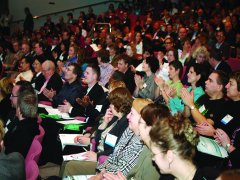Shaking up the library
Keeping libraries relevant to users was a key theme for speakers at the recent Online Information event, as Siân Harris discovered

Librarians have good grounds for being seriously worried,’ David Nicholas told delegates at last year’s Online Information event. ‘There is a massive demand for scholarly information because of improved access but the librarian’s role is not recognised,’ he explained. He believes that libraries are good at innovating but less good at evaluating their innovations. ‘We need more than simple COUNTER counting. That doesn’t give information about user-experience and satisfaction,’ he argued. ‘We need to move from hits and downloads to users, then on to impacts and outcomes.’ This is an issue that Nicholas and colleagues are tackling in the Centre for Publishing at University College London, UK. They use their deep log analysis techniques to create digital fingerprints of vast numbers of actions in cyber space and then match these fingerprints to demographic data. The results that they have observed might concern librarians and publishers, both of which invest considerable effort in making their websites and portals attractive to users. ‘One of the key characteristics of the virtual scholar is bouncing – they come in and go out again, never to return,’ commented Nicholas. ‘This is because of search engines and consumer choice. People search horizontally rather than vertically.’ Search engines are having some positive effects though, according to this research. ‘Using search engines people are far more likely to find older articles than they are through databases,’ said Nicholas. Nonetheless, all this adds up to a broken relationship between librarians and their users. ‘We all hope that people will trust librarians but few people even know that the library is involved,’ he said. He described how the supermarket chain Tesco put booths in some of their stores with medical information from the UK’s National Health Service. Many users thought the information provider was Tesco. Hugh Look, of Rightscom, made a similar observation in his talk. He described a recent survey of UK researchers. When asked where they got most of their information from, many respondents said Athens, which is actually just the authentication system that they use. For Janice Lachance, the CEO of the USA-based Special Libraries Association (SLA), the answer for an information professional in any organisation is to think the way that the people at the top think and get into what she described as the ‘executive mindset.’ She said that the time that executives spend searching for information is time that could be spent on running their businesses while informational professionals search out that information. ‘Every organisation needs a trusted intermediary,’ she pointed out. Her views were echoed by Allan Foster, the former director of library services at Keele University, UK and now an independent consultant. He said that ‘effective libraries need to be at the heart of their organisation’s culture and experiences.’ He believes that branding is an important issue for libraries, both in symbolic and practical terms, and described how alternatives to the words library and librarian have evolved, with phrases such as ‘library and information services’, ‘library and learning resources’, ‘knowledge communities’ and even ‘idea stores’. But beyond what are essentially marketing issues, there are some fundamental changes that Foster believes librarians can make to better serve their users. His recommendations included: continually innovating with customer services; forming organisational alliances; becoming part of their organisation’s knowledge infrastructures; embracing social technologies; and taking risks. Digital librarian Perla Innocenti of Italy’s Politecnico di Milano and her colleagues have been making just these types of changes, as she described to delegates. The challenge that they face in this large, technical university is how librarians can close the gap with students to provide seamless, integrated access to scientific, commercial and local resources. Recent projects that they have implemented to try to serve this diverse user-base include an online PhD thesis archive and an e-books service. She also identified training as an important issue. ‘We discovered that students can be very good at using computers in some ways but if they are presented with online information they often don’t know where to start,’ she said. She believes that the best approaches to developing successful library services are to look for partners on the university campus, to think big but also plan small and to plan on continually modifying and updating services. And this rapid response to change is something that librarians could learn from publishers, according to Tony McSean, director of library relations for Elsevier. As he told the conference, ‘publishers used to do five-year plans but now they do two-year plans and it gets a bit hazy by the middle of the second year.’ In contrast, the libraries that he used to work in would subscribe to a journal for at least five years, choose a library-management system for at least seven years and take two years to even get a new staff member familiar with all the processes in the library. And some libraries plan for centuries ahead, he pointed out. Perhaps libraries need to adjust their planning horizons as publishers have had to, suggested McSean. After all, he summed up, ‘both libraries and publishers live and die on the quality of the information we deal with. The future of scholarly communication is too important to leave to chance.’Think like an executive






